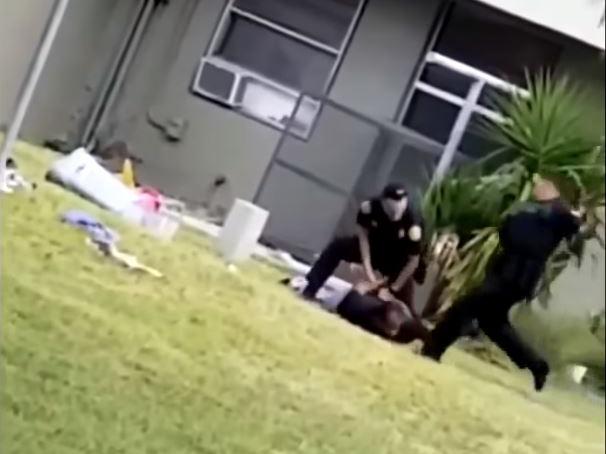Miami police officer Mario Figueroa suspended after footage emerges of him kicking handcuffed man in head
'I was disgusted by it. I think it’s evident that the officer acted irresponsibly and inappropriately'

Your support helps us to tell the story
From reproductive rights to climate change to Big Tech, The Independent is on the ground when the story is developing. Whether it's investigating the financials of Elon Musk's pro-Trump PAC or producing our latest documentary, 'The A Word', which shines a light on the American women fighting for reproductive rights, we know how important it is to parse out the facts from the messaging.
At such a critical moment in US history, we need reporters on the ground. Your donation allows us to keep sending journalists to speak to both sides of the story.
The Independent is trusted by Americans across the entire political spectrum. And unlike many other quality news outlets, we choose not to lock Americans out of our reporting and analysis with paywalls. We believe quality journalism should be available to everyone, paid for by those who can afford it.
Your support makes all the difference.The suspect in a car theft was face down on the ground and motionless. A Miami police officer had him handcuffed.
Then, as seen in a video recorded by a witness earlier this week, another officer came running towards the suspect, David Vladim Suazo, kicking him in the head before joining the other officer in pinning him to the ground. It seemed to many on Facebook to be an entirely unnecessary use of force, as the man showed no resistance to the arrest.
The officer’s superiors agreed. The Miami police chief, Jorge Colina, said the video depicted “a clear violation of policy” and suspended the officer, Mario Figueroa, with pay pending the results of an internal investigation.
Miami’s mayor, Francis Suarez, said in an interview on Friday that the suspension was the maximum punishment the department could immediately hand out under city policy – and that he wishes it could have been a harsher punishment.
“I was disgusted by it,” he said. “I think it’s evident that the officer acted irresponsibly and inappropriately. I was happy that our police chief acted immediately to suspend the officer.”
The state attorney for Miami-Dade County, Florida, Katherine Fernandez Rundle, said the public corruption unit of her office had immediately opened an investigation.
“I was shocked and appalled by what I saw,” she said.
It is not clear whether Mr Figueroa, who has been with the department for two years, would have faced such repercussions if not for the video recorded by Lisa Harrell, a neighbour who wrote on Facebook that she would “not let this go unnoticed”. She was successful; her video had been shared more than 5,000 times and had attracted considerable media attention.
The police report described a tense lead up to the events seen in the video, but did not mention Mr Figueroa kicking the suspect’s head.
The police spotted Mr Suazo in a stolen 2000 Jeep Cherokee and when an officer turned on a siren and ordered him to stop, Mr Suazo sped away through a residential complex, according to the police report.
He lost control at a dead end, jumping a sidewalk and crashing into a wall before fleeing on foot.
The police shouted at Mr Suazo to get on the ground and the police report said he took “a fighting stance” and swore at Mr Figueroa, who unsuccessfully fired his taser at him. The chase ended when another officer caught up to Mr Suazo and pointed his taser at him before taking him into custody.
Mr Figueroa and three other officers were wearing body cameras, but the footage from them was not immediately available.
Ms Harrell told the Miami Herald that she saw Mr Suazo give himself up.
“He ran around and then he was face-to-face with police,” Ms Harrell said. “He put his hands on his head. The police said, ‘lay down.’ He did. And then the police just came and kicked him.”
Mr Suazo was charged with grand theft, fleeing a police officer and traffic violations.
A 2013 investigation by the United States Department of Justice found that the Miami Police Department had engaged in a pattern of excessive force that resulted in a high number of shootings by officers, including the deaths of seven young black men over eight months in 2011. It cited “egregious” delays in the investigations of such shootings.
The city agreed in 2016 to implement a series of reforms, including enhanced supervision of officers and de-escalation training, that would be monitored by an independent reviewer. Mr Suarez cited a decline in homicides and police involved shootings as signs of success.
The New York Times